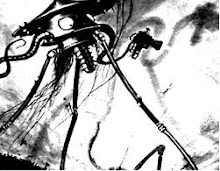American Journalism Protects the Powerful
Glenn Greenwald wrote last week about Tucker Carlson's admission to a key criticism of American journalism -- that reliance on official sources leads to a less critical press which enables those in power to govern without accountability. Here's the transcript from the exchange between Carlson and UK reporter Gerri Peev about a comment that Peev published from an on-the-record interview with Barack Obama adviser Samantha Power [emphasis from Greenwald]:
CARLSON: What -- she wanted it off the record. Typically, the arrangement is if someone you're interviewing wants a quote off the record, you give it to them off the record. Why didn't you do that?Instead of holding the powerful accountable, the American press serves as a "holder of secrets" in return for access to official sources. Carlson's philosophy has major holes -- the idea that this kind of symbiotic behavior between the press and the powerful will yield truths is laughable. What reason would the powerful have to give up any truths on-the-record? The current model exempts the powerful from any public scrutiny -- the press have essentially given the powerful, willingly, their only mechanism for holding public officials accountable and there is little reason to think that accountability will be applied voluntarily.PEEV: Are you really that acquiescent in the United States? In the United Kingdom, journalists believe that on or off the record is a principle that's decided ahead of the interview. If a figure in public life.
CARLSON: Right.
PEEV: Someone who's ostensibly going to be an advisor to the man who could be the most powerful politician in the world, if she makes a comment and decides it's a bit too controversial and wants to withdraw it immediately after, unfortunately if the interview is on the record, it has to go ahead.
CARLSON: Right. Well, it's a little.
PEEV: I didn't set out in any way, shape.
CARLSON: Right. But I mean, since journalistic standards in Great Britain are so much dramatically lower than they are here, it's a little much being lectured on journalistic ethics by a reporter from the "Scotsman," but I wonder if you could just explain what you think the effect is on the relationship between the press and the powerful. People don't talk to you when you go out of your way to hurt them as you did in this piece.
Don't you think that hurts the rest of us in our effort to get to the truth from the principals in these campaigns?
PEEV: If this is the first time that candid remarks have been published about what one campaign team thinks of the other candidate, then I would argue that your journalists aren't doing a very good job of getting to the truth. Now I did not go out of my way in any way, shape or form to hurt Miss Power. I believe she's an intelligent and perfectly affable woman. In fact, she's -- she is incredibly intelligent so she -- who knows she may have known what she was doing.
She regretted it. She probably acted with integrity. It's not for me to decide one way or the other whether she did the right thing. But I did not go out and try to end her career.
Read the entire Greenwald post -- he goes on to talk about Tim Russert's admission in testimony during the Scooter Libby trial that all of this interviews with public officials are strictly confidential. Who does this man serve? Not the public.



No comments:
Post a Comment